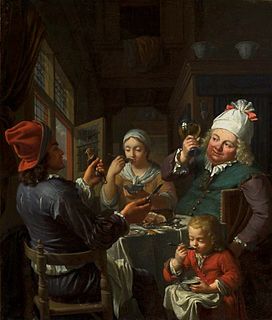 W
WBeer is one of the oldest and most widely consumed alcoholic drinks in the world, and the third most popular drink overall after water and tea. It is produced by the brewing and fermentation of starches, mainly derived from cereal grains—most commonly from malted barley, though wheat, maize (corn), rice, and oats are also used. During the brewing process, fermentation of the starch sugars in the wort produces ethanol and carbonation in the resulting beer. Most modern beer is brewed with hops, which add bitterness and other flavours and act as a natural preservative and stabilizing agent. Other flavouring agents such as gruit, herbs, or fruits may be included or used instead of hops. In commercial brewing, the natural carbonation effect is often removed during processing and replaced with forced carbonation.
 W
WCulinary tourism or food tourism or gastronomy tourism is the exploration of food as the purpose of tourism. It is now considered a vital component of the tourism experience. Dining out is common among tourists and "food is believed to rank alongside climate, accommodation, and scenery" in importance to tourists.
 W
WA foodie is a person who has an ardent or refined interest in food, and who eats food not only out of hunger but also as a hobby. The related terms "gastronome" and "gourmet" define roughly the same thing, i.e. a person who enjoys food for pleasure. But the connotation of "foodie" differs slightly—a sort of everyman with a love for food culture and different foods, but some, like Paul Levy, say the foodie can still be a "foodist".
 W
WGifaata or Gifaataa is a cultural festival celebrated by the Wolayta people in the Southern Region of Ethiopia. This festival is celebrated each year in September. In this celebration, the Wolayta accept the New Year and send off the old one. Gifaata means, "the beginning," and is also considered the bridge from old to new, dark to light. During Gifaata, the Wolayta dance and enjoy cultural foods. The significance of Gifaata is to eliminate issues of the past and start afresh, reconciling past quarrels and strengthening family and community ties moving forward.
 W
WGluttony means over-indulgence and over-consumption of food, drink, or wealth items, particularly as status symbols.
 W
WA gourmand is a person who takes great pleasure and interest in consuming good food and drink. Gourmand originally referred to a person who was "a glutton for food and drink", a person who eats and drinks excessively; this usage is now rare.
 W
WA grace is a short prayer or thankful phrase said before or after eating. The term most commonly refers to Christian traditions. Some traditions hold that grace and thanksgiving imparts a blessing which sanctifies the meal. In English, reciting such a prayer is sometimes referred to as "saying grace". The term comes from the Ecclesiastical Latin phrase gratiarum actio, "act of thanks." Theologically, the act of saying grace is derived from the Bible, in which Jesus and Saint Paul pray before meals. The practice reflects the belief that humans should thank God who is the origin of everything.
 W
WA harvest festival is an annual celebration that occurs around the time of the main harvest of a given region. Given the differences in climate and crops around the world, harvest festivals can be found at various times at different places. Harvest festivals typically feature feasting, both family and public, with foods that are drawn from crops that come to maturity around the time of the festival. Ample food and freedom from the necessity to work in the fields are two central features of harvest festivals: eating, merriment, contests, music, and romance are common features of harvest festivals around the world.
 W
WThe Harvest Festival of Thanksgiving is a celebration of the harvest and food grown on the land in the United Kingdom. It is about giving thanks for a successful crop yield over the year as winter starts to approach. The festival is also about giving thanks for all the good and positive things in our lives such as family and friendships. Harvest Festivals have been traditionally held in churches but also in schools and sometimes in pubs. Some estates and farms used to hold a harvest festival in a barn. In some towns and villages the harvest festivals are set so that the different churches do not have it on the same day. People bring in produce from their garden, allotment or farm. Often there is a Harvest Supper when some of the produce is eaten. Typically surplus produce is given away to a local charity, hospital or children's home or auctioned for charity.
 W
WIrreecha, is thanksgiving holiday celebrating the end of the winter in Oromia Region, Ethiopia. The Oromo people celebrate Irreecha to thank Waaqa (God) for the blessings and mercies they have received throughout the previous year. The Irreecha festival is celebrated every year at the beginning of Birraa (Spring), new season after the dark and rainy winter season. It is attended by hundreds of thousands people. The thanksgiving is celebrated at sacred lakes across Oromia and Hora Harsadi, Bishoftu, Oromia as a whole. Once at the lake, festival-goers immerse freshly cut green grass and the flowers they are carrying and sprinkle themselves and place in water.
 W
WThe Sake Sommelier Association (SSA) is a global partnership of talented Sake Educators providing and accrediting sake courses and working to benefit the world of sake.
 W
WThanksgiving is a national holiday celebrated on various dates in the United States, Canada, Grenada, Saint Lucia, and Liberia. It began as a day of giving thanks and sacrifice for the blessing of the harvest and of the preceding year. Similarly named festival holidays occur in Germany and Japan. Thanksgiving is celebrated on the second Monday of October in Canada and on the fourth Thursday of November in the United States and around the same part of the year in other places. Although Thanksgiving has historical roots in religious and cultural traditions, it has long been celebrated as a secular holiday as well.
 W
WWine and food matching is the process of pairing food dishes with wine to enhance the dining experience. In many cultures, wine has had a long history of being a staple at the dinner table and in some ways both the winemaking and culinary traditions of a region will have evolved together over the years. Rather than following a set of rules, local cuisines were paired simply with local wines. The modern "art" of food pairings is a relatively recent phenomenon, fostering an industry of books and media with guidelines for pairings of particular foods and wine. In the restaurant industry, sommeliers are often present to make food pairing recommendations for the guest. The main concept behind pairings is that certain elements in both food and wine interact with each other, and thus finding the right combination of these elements will make the entire dining experience more enjoyable. However, taste and enjoyment are very subjective and what may be a "textbook perfect" pairing for one taster could be less enjoyable to another.